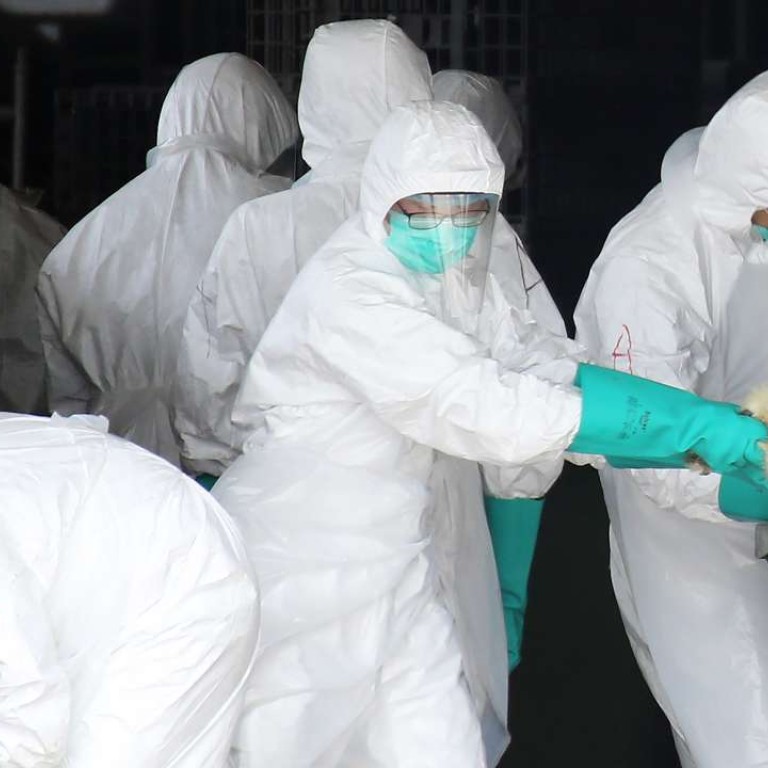
Culling begins: 4,500 chickens to be killed as Hong Kong farm tests continue
Health chief hopes all results will be in before Tuen Ng Festival on Thursday
The culling of 4,500 live birds at the Cheung Shan Wan temporary wholesale poultry market began on Tuesday morning, after a faecal sample from a Tuen Mun market was confirmed to contain the potentially fatal H7N9 virus on Saturday.
Officers from the Agriculture, Fisheries and Conservation Department, who were dressed in full personal protective equipment, including protective clothing, goggles, masks and shields, arrived at the market in the morning to prepare for the operation.
Live chickens were placed in large plastic bins, which were then filled with carbon dioxide. The 48 local animals were killed first, followed by some 4,000 mainland poultry.
Officers from the Centre for Health Protection also arrived to monitor the health status of workers involved in the culling.
Health minister Dr Ko Wing-man said after a cross-departmental meeting on Monday that destruction of live poultry was part of the sanitisation measures.

He said trade would be resumed if test results from all samples collected at the 29 local chicken farms turned out to be negative. Ko had earlier said that rapid tests were expected to be completed in the next day or two.
The Agriculture, Fisheries and Conservation Department has since completed inspections at all chicken farms in the city.
In total, 3,360 samples have been collected from the poultry, with 2,370 having been thoroughly tested so far, all of which were negative for the virus.
Live chicken supplies were suspended on Sunday after a bird faeces sample taken from a Tuen Mun market on May 16 tested positive for H7N9. It is not known if the virus was from local or imported birds as there was a mix of both at the market.
“If test results from all collected samples turn out to be negative, we have decided that we may resume live poultry trade operations,” Ko said after an interdepartmental meeting on Monday.
“We hope we will be able to complete the work before [Thursday’s] Tuen Ng Festival.”

Compensation will be discussed with poultry vendors later.
Ko said the government could not underestimate the virus and this was a risk society had to take for operating a live poultry trade.
“Whilst the virus is of low pathogenicity in poultry, it is of relatively high pathogenicity when human beings are infected,” he said.
Ko made the point hours after University of Hong Kong microbiologist Dr Ho Pak-leung said human-to-human transmission of avian influenza remained low based on current signs.
“The incubation period of the virus usually lasts for several days. If someone has been infected, the symptoms should have been shown already. But currently no one has been found to carry the H7N9 virus,” he said in a radio interview on Monday.
Leung Wai-tong of the Poultry Dealers and Workers Association said the government would have to compensate traders at least HK$30 to HK$35 per chicken.
Lee Leung-kei of the New Territories Chicken Breeders Association said culling was a government policy traders would just have to accept.
The 4,500 quarantined birds would die if not sold in the next few days anyway, he said.


